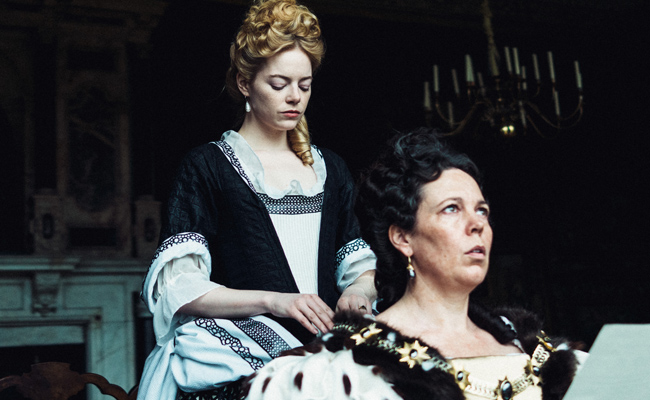
From The Lobster director Yorgos Lanthimos and writers Deborah Davis and Tony McNamara comes The Favourite, at long last a movie about kings and queens and regal ladies that doesn’t venerate the monarchy. It feels like the period piece I’ve always wanted.
Prolific British television actor Olivia Colman plays Queen Anne, the gout-addled ruler of early 18th century Great Britain who’s so caught up in her 17 rabbits (one for every child she birthed stillborn or who died in infancy) that she can’t remember if there’s a war on. Rachel Weisz plays Lady Marlborough, the queen’s “favourite” and the real political operator at court. How does one become the queen’s favorite? Mostly by pleasuring her in the bed chamber (which could mean just rubbing her gouty legs or actual genital stimulation) and humoring her latest weird whim, like gorging fine cheeses or racing fancy ducks.
As Columbia professor Julie Crawford explained to The Cut, “There wasn’t a radical separation between what we recognize as sexual intimacy and the other kinds of bodily intimacy with which people lived at the time, particularly for elite people, who had women who literally undressed them and washed their vaginas.”
Into this mix comes Abigail, played by Emma Stone, a fallen noblewoman and cousin of Lady Marlborough who has come to court to find a job and maybe redeem her family name. On the way there she shares a carriage ride with a soldier who stares at her while he tugs himself under his pants (the year’s best IMDB credit), and when she goes to get out she falls face-first into the muck trying to avoid his grope. “This mud stinks,” she says to a servant boy at court. To which he replies matter of factly, “They shit in the streets here.”
That’s sort of The Favourite in a nutshell, brutally accurate to the nitty-gritty of life in the early 18th century with dialogue made modern enough to understand and glib enough to be consistently hilarious.
It’s hard to convey just how refreshing this is. For a long time the only strong female character Hollywood screenwriters could think to write were actual queens. And so the salient factor for most period pieces, basically all the way up to now, was a famous actress acting wickedly imperious. The goal was apparently for audiences to shout “yaaas queen!” at an actual queen, which is pretty much the most neoliberal horseshit ever. Monarchs were “powerful,” sure, and Elizabeth I in particular certainly deserves credit for being both a pioneer and a savvy operator, but almost by definition European royalty mainly consisted of the inbred failchildren of the rich.
The Favourite is the perfect period piece for a world beset by failchildren. Consider: the last two Supreme Court appointees (appointed for life!) came from the same tony prep school, and the current Secretary of Education is the heir to an auto parts fortune who married the heir to a multi-level marketing scam. Failchildren are everywhere, still with outsized influence over our daily lives.
When Abigail first comes to court she’s thrown in with the help — the herb choppers, floor scrubbers, and royal chamber pot cleaners, the folks who have to clean the duck shit and procure the lobsters. She sleeps head to foot in a tiny room with 20 other people. Contrasting the claustrophobic life of the poor, Lanthimos shoots the doings of the queen and Lady Malborough — which includes frequent verbal jousts with outrageous fops in white face paint with huge drawn-on moles, like Harley, leader of the Whigs, played by Nicholas Hoult — in a wide-angle, fish-eye lens that’s a little distracting at first. But Lanthimos’s purpose is clear: the life of the rich was drafty and antiseptic, with out-of-touch nobles eating fussy cakes in cavernous rooms while making policy for common folk far, far away, whose lives they almost certainly didn’t have the imagination to understand.
Lanthimos treats this aristocracy with the absurdism it warrants, in all its powder-faced, macro-sleeved, doily wristed, duck-racing glory. This is the baroque era, of preposterously large wigs and gilded everything, which underscores the decadent silliness of the entire ruling class. It’s also amazing to look at, where essentially every outfit, especially the men’s, is its own Alice In Wonderland sight gag. The sleeves! They’re all proportioned like Lenny Kravitz’s macro scarf. “Does the duck have to be here?” an exasperated Marlborough asks the leader of the Tories, and owner of “the fastest duck in the city.”
Davis and McNamara play a little loose (historically) with the dialogue, but only for the clear purpose of properly conveying the era’s true ridiculousness. And I’m glad they did, what with creative vulgarities like Harley describing a friend as “quite cuntstruck” and Abigail relating being sold to “a balloon-shaped German with a thin cock.”
Portraying the queen as pathetic and out of touch rather than calculating and queenly for once (and Olivia Colman’s performance is magnificent) not only feels more accurate to a system of rule-by-ancestry, it also allows for so many more interesting female roles. Weisz and Emma Stone spewing diamond-sharp dialogue while trying to outflank each other for Colman’s affections is a symphony. “I like it when she puts her tongue inside of me!” snaps Colman.
In an era of period pics (Mary Queen Of Scots, Outlaw King, etc) that generally range from disappointing to mildly disappointing, The Favourite is truly outstanding. Finally, a movie that treats individual aristocrats as flesh-and-blood humans and the aristocratic class with the appropriate derision.
Vince Mancini is on Twitter. You can find his archive of reviews here.






